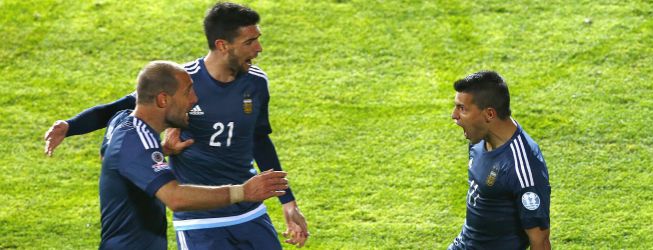Romero: He had little work throughout the match, but when he had to intervene, he did it almost always well. His only mistake was a bad clearance that left Rolán completely alone, but he didn't take advantage of it. He saved Argentina in the final minutes.
Zabaleta: Like the entire Argentine defense, he had little work. In the first half, his teammates missed his forward runs. Later on, he was braver and his team took advantage of it. A fantastic cross from him led to Agüero's goal.
Otamendi: He was solid, had barely any defensive work, but he solved it with guarantees. He dared to play the ball a couple of times. In the second half, he had to intervene much more against the Uruguayan push.
Garay: Like his defensive partner, he was correct. Very attentive to the long passes that looked for Rolán and Cavani. In the second half, he suffered more as Uruguay pushed for the draw and created more problems than expected.
Rojo: He was better in the first half when his team attacked more on his side. He joined the attack well, although he lacked precision when crossing and combining. In the second half, he was more focused on defensive tasks than on joining the attack.
Mascherano: That life insurance called Javier Mascherano. The few times Uruguay managed to get close to the opponent's area, the 'Jefecito' solved it. With Biglia and Pastore accompanying him, he was more liberated from the ball distribution tasks and more attentive to covering his teammates' backs.
Pastore: Probably one of the best of the match. Despite being closely watched by the Uruguayan midfield, when he received the ball between the lines, he caused damage. His mobility helped him elude opponents, and his quality did the rest. With the ball at his feet, he is a true magician. He saw the spaces perfectly and always placed his teammates in good positions. In the second half, he was somewhat more absent due to fatigue.
Biglia: He played well, understood perfectly what Martino asked of him. He brought consistency to the Argentine game and controlled ball possession. His vertical passes served to break the Uruguayan defensive lines. He constantly found Pastore, and the two of them moved the whole team.
Di María: One of the most active players in the beginning of the match. His speed with the ball and his long runs added rhythm to the Argentine game. He had a couple of clear chances, but he rushed when it came to finishing. He improved when he focused more on his position and could associate with his teammates.
Agüero: He was absent during the first half, tried to fix the Uruguayan defenders but failed to connect with Messi, Pastore, or Di María. In the second half, he didn't participate much in the game, but he scored when he had the chance, and that was the difference.
Messi: Without playing a spectacular match, every time he had the ball on the right side, Uruguay trembled. He didn't seek the goal as much as in other occasions, but he did make several good passes that could have ended in a goal. When he joined forces with Pastore, magic happened, and the two of them broke down Tabárez's solid defensive system. In Uruguay, they could only stop him with fouls. In the final minutes, he became more aggressive and looked for the goal, but he repeatedly crashed into Muslera.
Banega: He came on in the second half in place of Pastore, trying to slow down the game and have more ball control, but he didn't succeed. It is true that in those final minutes, Uruguay also increased their defensive pressure.
Tévez: He replaced Agüero almost at the end of the match and his role was to press strongly up front and keep the ball to provide an outlet for his team.
Check AS for the calendar of day by day matches, all the results of the matches (both in the group stage and in the final stage), as well as the latest news, the best photo galleries, and the videos (goals, summaries of the matches, technical details, great plays, Menotti's analysis...) of the Copa América 2015.

